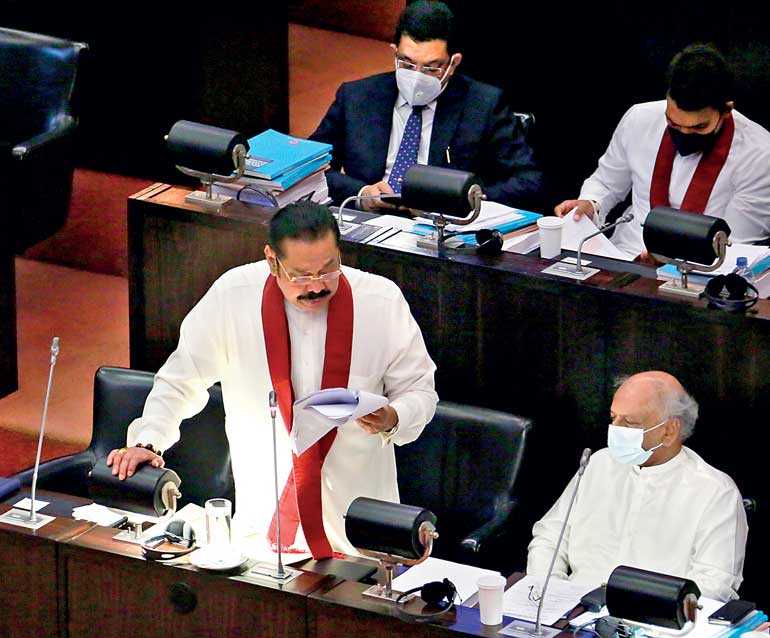Friday Feb 20, 2026
Friday Feb 20, 2026
Tuesday, 19 January 2021 01:14 - - {{hitsCtrl.values.hits}}

Budget 2021 was a unique opportunity for a strong, capable government to implement difficult reforms to address Sri Lanka’s priorities. Alas, they lost this opportunity
The national budget is a financial plan, not a policy statement. Specific budget proposals become nonsense, unless they form part of a consistent whole. Unfortunately, Budget 2021 parts did not add up to a consistent whole. Yet, Sri Lanka’s leadership in both public and private domains did not seem to care.
Parliament and corporate response to the 2021 Budget
Budget 2021 was presented in Parliament on 17 November 2020. Several analysts with knowledge, experience, and integrity reported that this budget 1) provided no numeric estimates of the revenue impact of the budget proposals (e.g. revenue lost or gained under each tax revision or concession); 2) had key estimates differing between the budget speech and the statistical tables by Rs. 50-70 billion, (e.g. Rs. 1,961 billion vs. 2,019 billion for revenue, Rs. 3,525 billion vs. 3,594 billion for expenditure); and 3) had glaring inconsistencies between the budget proposals and associated numeric targets (highlighted below). However, on 10 December 2020, Budget 2021 was approved by parliament with a two thirds majority.
I have evaluated national budgets at post-budget seminars for over 15 years and been invited by the Parliamentary Committee on Public Finance (COPF), previously and this year, to help them analyse the budget. Never have I felt such despair for the management of this country’s finances.
Yet, observations in public by members of the corporate sector conveyed that they were either nervous of the adverse consequences of a thoughtful opinion or totally self-absorbed. Their observations only referred to tax breaks and concessions given to their own businesses. One panellist even contradicted his own words. He began by saying how happy he was that Budget 2021 gave his sector incentives instead of handouts, but in the next breath, asked the Government for a handout to pay employees in that sector during COVID-19! The newspapers quoted this. Sadly, corporate sector comments were uniformly superficial. Not one made any reference to the bigger picture – that the numbers did not match with statements in the budget speech and that the strategies presented could not deliver what they said they would, given the extremely difficult financial situation Sri Lanka is facing.
A new government with Sri Lanka at crossroads
This was the maiden budget of a strong new government, elected with the people’s blessings, with greater powers under the 20th Amendment to the Constitution and a two-thirds majority in Parliament. Budget 2021 was a unique opportunity for a strong, capable government to implement difficult reforms to address Sri Lanka’s priorities. Alas, they lost this opportunity.
Sri Lanka is at a crossroads in a new global reality created by COVID-19. This reality underlines the fragility of global connectivity and uncertainty of pre-COVID-19 economic activities as we knew them. International and domestic movement of people, goods, and services can no more be taken for granted. Sri Lanka’s priorities must adjust to this new reality.
As I see it, Sri Lanka’s immediate priorities should be to address:
Sri Lanka’s long-term priorities should be to reverse:
Budget 2021, oblivious to reality, ignored both pandemic and priorities.
Irrelevant Budget
The Government’s policy statement, ‘Vistas of Prosperity and Splendour’ is embodied in its 10 key principles. As I see it, those principles can be divided into three categories, People, Environment, and International Relations.
People: People centric economic development (6) in a technology based society (7) with a productive citizenry and a vibrant human resource (5) in a disciplined, law abiding and values-based society (10) under a new constitution that fulfils the people’s wishes (4) and an administration free from corruption (3), giving priority to national security (1).
Environment: Development of physical resources (8) with sustainable environmental management (9).
International Relations: A friendly, non-aligned, foreign policy (2).
The budget speech hit some good buttons, consistent with their vision and Sri Lanka’s current reality – support the rural heartland, agriculture and small entrepreneurs; protect the environment; promote technology and vocational training; raise investment; curtail non-essential imports and expand exports; etc. However, budgetary allocations in the Appropriation Bill told a different story, as follows:
People: The Ministries of Defence (Rs. 355 b) and Highways (Rs. 330 b) were allocated 26% of total expenditure (Rs. 2,678 b), while Health (Rs. 220 b), during a COVID-19 crisis, Education and related ministries, including pharmaceuticals, distance learning, technical and vocational skills and education reforms, (Rs. 177 b) together, were allocated only 15% in total.
Most people live in rural communities. Yet, 15 ministries responsible for their key needs—agriculture, fisheries and livestock, irrigation and water supply—together only received an allocation of 10% (Rs. 262bn) of the total. The major share of Sri Lanka’s employment and output (GDP) is with her informal sector, not corporates. In Sri Lanka’s labour force, 53% work in the informal sector. They have no social security. 18% work in the public sector and only 29% work in the formal private sector. Yet, significant tax concessions and incentives in the budget prioritised listed or large corporates. The vast majority will continue to pay indirect taxes on their basic consumption, inconsistent with principle 6.
Critical structural reforms to address the mismatch between products of the education system and needs of the labour market, particularly English, mathematical, analytical and technological skills, identified in the policy statement, need funds. Yet, education reforms, vocational training and research and innovation received a paltry Rs. 15 b (0.5% of total expenditure), despite principles 5 and 7.
Critical structural reforms in the wage structure and labour laws to address employee dissatisfaction and reverse the exodus of professional, skilled and unskilled persons from Sri Lanka need funds. Without budgetary allocations for such reforms, brain and skills drain will continue, contrary to principle (5).
Environment: The entire allocation for the environment (Rs. 9 b) is below 3% of the Defence or Highways allocations. The environment is facing serious problems due to ill-conceived construction, encroachment, poaching, illicit logging and destruction of national parks, dry zone forest cover, rainforests, mangroves and wetlands. Yala, Wilpattu, Sinharaja, Anawilundawa, Mannar, Moneragala are examples highlighted in mainstream and social media recently. This budget only pays lip service to principles 8 and 9. Soon, we will have nothing to attract tourists in the short term nor for future generations in the long term.
International Relations: This budget has been unable to build confidence with long-term foreign investors (highlighted below) to raise foreign investment, despite principle 2.
In summary, monetary allocations in Budget 2021 were neither relevant to the government’s vision nor Sri Lanka’s short-term and long-term priorities.
Unrealistic Budget
Budget 2021 estimates and strategies were unrealistic. For example,
1.The Budget’s GDP growth estimates were -1.6% for 2020 and +5.5 for 2021. Official GDP statistics released on 15 December recorded a contraction of -5.3% for the first three quarters of 2020. With the COVID-19 second wave, 2020 GDP will obviously contract by more than -5.3 %, highlighting the unrealistic optimism of GDP estimates.
2.The investment estimate was also optimistic. The official release of 2020 2nd Quarter GDP contraction of -15.3% was delayed by three months. Loss of confidence among potential local and foreign investors, by the deliberate withholding of official statistics, cannot be overcome by tax breaks and incentives. Two rating agencies, Fitch and Moody’s, downgraded Sri Lanka recently, criticising economic management. Subsequently, the Citi Group went further, actually stating that the Government is “in denial”. Serious long-haul investors will want positive signals from rating agencies. Who will invest here now?
3.The estimates for inflation and private sector credit expansion were inconsistent. The State Minister stated that there will be no IMF bailout, while the budget speech stated that bilateral loans and domestic borrowing would meet the deficit. This conveys that government will borrow from captive sources like state banks, EPF and ETF. Till now, with low private credit demand, interest rates have remained low. The estimated optimistic rise in private sector credit by 14.7% (6% in 2020), together with high Government borrowing and low interest rates cannot all three be reconciled. Alternatively, printing money will raise inflation to well over the 5% estimate.
4.Revenue was overestimated in relation to actual data up to October. With the tax breaks and tax holidays given, from where will this huge revenue appear in this current climate?
5.Budget 2021 made no effort to trim public sector expenditure, contradicting the policy statement. The deficit will likely be higher than estimated due to higher recurrent expenditure and debt repayments, unless investment is cut below budget, as has been done in the past.
6.The unrealistic economic strategies proposed for import substitution and export and investment promotion, respectively, were tried and failed in the Bandaranaike Government of ’70-77 and the Jayawardena Government of ’77-’90. Can old rhetoric promoting failed ideas succeed 30-50 years later?
In summary, Budget 2021 numbers were both unrealistic and inconsistent with Sri Lanka’s current economic and financial situation.
In conclusion, this budget is a farce set in an alternate reality. I cannot understand whether those who prepared it and who supported it are entirely devoid of thinking capacity or callously devoid of any regard for our people and our environment. Are they playing ostrich to fool themselves or making the emperor parade in his new clothes to fool himself and others? Either way, during 2021 and beyond, Sri Lanka will remain a country of vast potential and lost opportunities.
(The author is a former Assistant Governor and Director of Statistics of the Central Bank of Sri Lanka.)